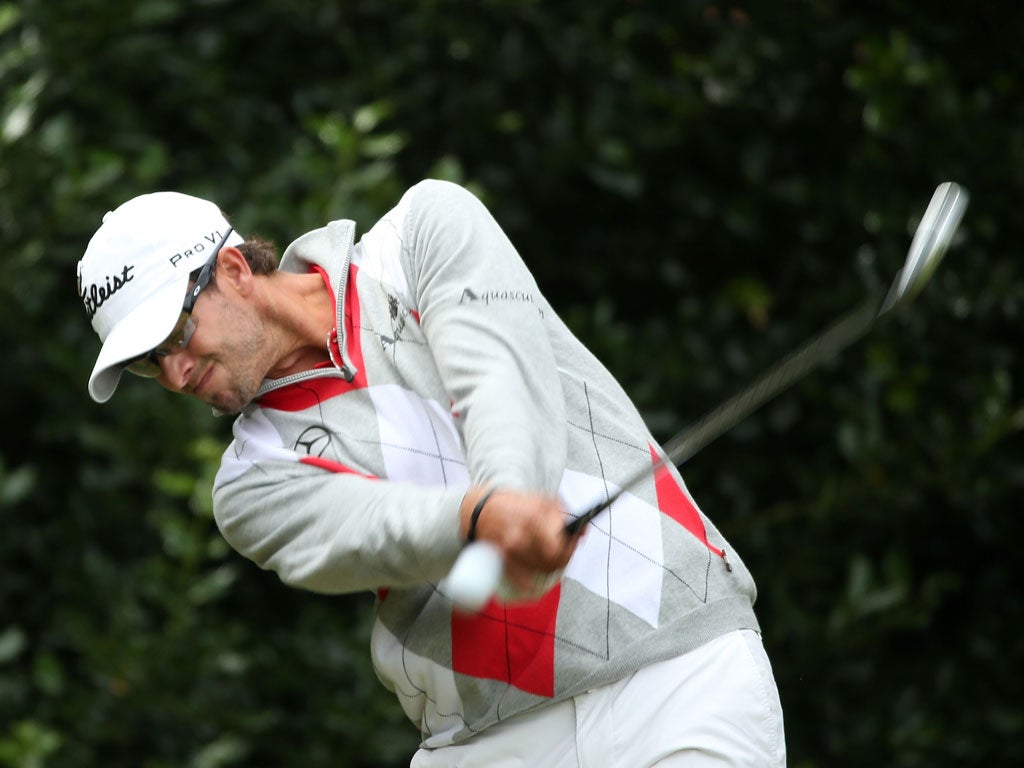Adam Scott must take stock over anchored putter ban

Masters champion Adam Scott is among the players who must now decide whether to take independent legal action against the outlawing of anchored strokes after the PGA Tour announced it will implement the ban from January 1, 2016.
The R&A and USGA, the game's governing bodies, approved Rule 14-1b in May after consideration of comments and suggestions made during the 90-day consultation process.
The European Tour supported the proposal, but the PGA Tour and PGA of America had previously voiced strong opposition, raising the possibility of different rules being followed in different events.
The PGA Tour runs the lucrative American circuit and plays a dominant role in staging World Golf Championship events, while the PGA of America organise the US PGA Championship and American Ryder Cup team. Traditionally they adopt the rules of golf as determined by the R&A and USGA, who run the Open Championship and US Open respectively.
In May, the PGA Tour said it would discuss the matter with its Player Advisory Council and Policy Board members and, having done so today, announced it would "allow" the ban.
However, Scott - whose win at Augusta in April completed the 'anchored putter' slam of all four major titles - is among those confirmed to have taken legal advice on the issue. Boston-based lawyer Harry L. Manion told GolfDigest.com that he represents nine players, including Scott, South African Tim Clark and Sweden's Carl Pettersson.
Clark told reporters at the Crowne Plaza Invitational: "We do have legal counsel. We're going to explore our options. We're not going to just roll over and accept this."
Scott appears more prepared to change, saying on May 8: "I don't really have a backup plan. I'm just going to keep doing what I'm doing and deal with it then. I don't think there will be anything much for me to change. If I have to separate the putter a millimetre from my chest, then I'll do that."
A statement from the PGA Tour confirmed the ban would be implemented, but urged the USGA and R&A to allow amateurs more time to use anchored strokes - in a similar manner to how the rule on "square" grooves was brought in - and warned that every rule would not always be followed.
"The PGA Tour Policy Board today acknowledged that the USGA's ban on anchored strokes, known as Rule 14-1b, will apply to PGA Tour competitions beginning on January 1, 2016," the statement read.
"In making this acknowledgement, the Policy Board also passed a resolution strongly recommending, along with the PGA of America, that the USGA consider extending the time period in which amateurs would be permitted to utilise anchored strokes beyond January 1, 2016.
"PGA Tour competitions are conducted in accordance with the USGA Rules of Golf. However, the Policy Board reserves the right to make modifications for PGA TOUR competitions if it deems it appropriate."
PGA Tour commissioner Tim Finchem said: "In making its decision, the Policy Board recognised that there are still varying opinions among our membership, but ultimately concluded that while it is an important issue, a ban on anchored strokes would not fundamentally affect a strong presentation of our competitions or the overall success of the PGA Tour.
"The Board also was of the opinion that having a single set of rules on acceptable strokes applicable to all professional competitions worldwide was desirable and would avoid confusion.
"The Policy Board continues to believe that extending the time period the ban would go into effect for amateurs would be beneficial for golf participation and the overall health of the game.
"Although the Board has elected to follow the USGA in this case at the elite level, it continues to be mindful of its responsibility to review future rule changes that might be adopted by the USGA in order to determine whether they should apply to PGA Tour competitions.
"It is not inconceivable that there may come a time in the future when the Policy Board determines that a rule adopted by the USGA, including in the area of equipment, may not be in the best interests of the PGA Tour and that a local rule eliminating or modifying such a USGA rule may be appropriate.
"Having said that, we have been assured by the USGA that as we move forward we will have an open and effective communication process on a number of levels with the decision makers at the USGA.
"Importantly, this will include a direct communication between the Commissioner's Office of the PGA Tour and the USGA Executive Committee. Such a process will ensure that our position is fully and carefully considered and addressed in future rule making."
PA
Join our commenting forum
Join thought-provoking conversations, follow other Independent readers and see their replies
Comments
Bookmark popover
Removed from bookmarks